Condition Control Statements in C
In this tutorial, we will discuss the essential topic of conditional statements. There are five categories of conditional statements: If simple statements, if-else clauses, else-if clauses, and Switch case statements, which are nested if statements. With time, let's dive into the concept.
Conditional Statements
Conditional statements are used in C to run code based on particular conditions. These statements enable the program to make decisions and manage the execution flow. Conditional statements in C are important in programming because they allow the program to make decisions and conduct actions based on certain scenarios.
Conditional Statement Types in C
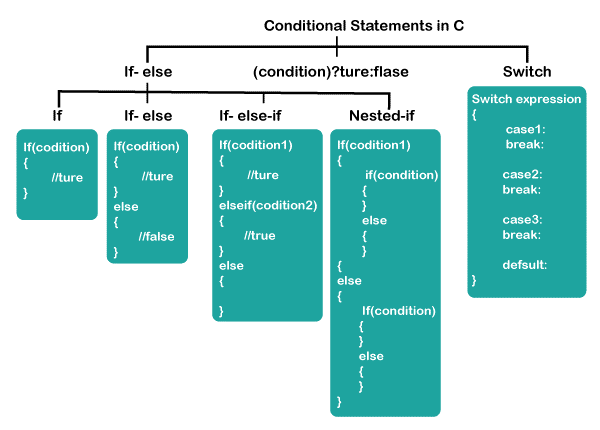
It is divided into five categories.
- If simple statements
- if-else clauses
- else-if clauses
- nested if statements
- Switch case statements
In C, what is an if statement?
In C programming, one of the most popular conditional statements is the "if" expression. A standard if statement is utilized to alter the current process and execute some code when the condition is true. The code in the block that follows the "if" statement is only run if a specific condition is discovered to be true, which is utilized to make this decision. The code in the "if" block will be skipped if the condition is false.
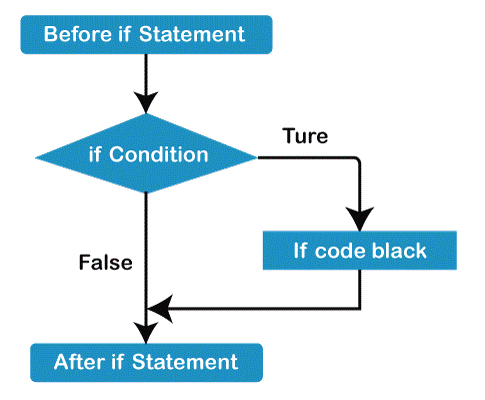
Syntax:
if (condition/expression) {
//if the condition/expression is true, this block of code will be executed//
}
How do if statements function?
The statements in the body are carried out if the test condition is true. The statement inside the body is not run if the test condition is false. Look at the illustration below. Think about the first example. n has a value of 10. And it must be less than 15 for us to find out. Yes, it is less than 15 because the value of n is 10. The requirement is, therefore, satisfied. Therefore, the assertions included within the if block will be carried out. In the second case, we check whether n is more than 15. It's untrue what they say. Therefore, it continues to the following expression without running the if block.
Example1:
#include<stdio.h>
int main()
{
int n=10;
if(n<15) //Condition/Expression
{
printf("n is smaller than 15, our requirement is satisfied");
}
printf("Oops!, our requirement is not satisfied");
return 0;
}
Output:

Example2:
#include<stdio.h>
int main()
{
int n=18;
if(n<15) //Condition/Expression
{
printf("n is smaller than 15, our requirement is satisfied");
}
printf("\nHello friends!");
return 0;
}
Output:

An if-else statement in C
With the help of the if-else statement in the C programming language, you can run one block of code if a particular condition is true and another block of code if it is false. It allows you to make judgments and regulate the flow of the program based on various variables. This other block is entirely optional.
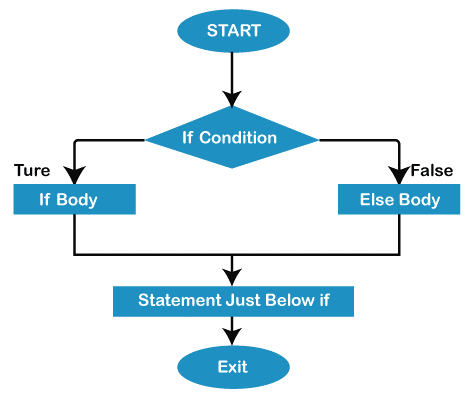
Syntax:
if (condition/expression)
{
//if the condition is true, this block of code is executed//
}
Else
{
//if the condition is false, this block of code is executed//
}
Statements;
How does an if-else sentence work?
If the test condition is true, the statement within the body of if is performed. As a result, the statement within the main part of else can be skipped during execution.
If the test condition is false, the statement within the else body is executed. As a result, the statement within the main body of it can be skipped during execution.
Example:
#include<stdio.h>
int main()
{
int n=25;
if(n<15)
{
printf("The value n is smaller than 15");
}
else
{
printf("The value n is greater than 15");
}
return 0;
}
Output:
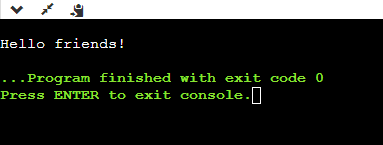
How do else-if statements function?
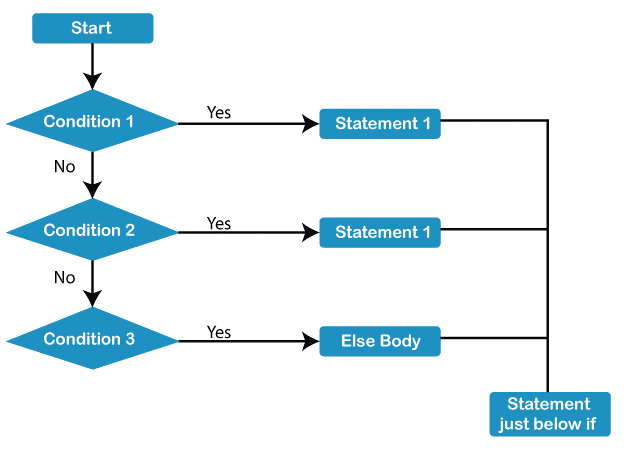
Assume that the first if condition is satisfied and the conditional statement is true. The statements in the else-if conditional will be performed if the conditional statement returns to false and the next else-if expression returns to true. The otherwise portion is executed if nothing of the if or else-if criteria are met.
Syntax:
if (condition1/expression1)
{
// block of code
}
else if(condition1/expression1)
{
// block of code
}
else if (condition1/expression1)
{
// block of code
}
.
.
else
{
// block of code
}
Example:
#include <stdio.h>
int main()
{
int first_num, second_num;
printf("Please enter any two integers: ");
scanf("%d %d", &first_num, &second_num);
//verifies if the two integers are equal.
if(first_num== second_num)
{
printf("Result: %d = %d",first_num,second_num);
}
//verifies if first_num is greater than second_num.
else if (first_num > second_num)
{
printf("Result: %d > %d", first_num, second_num);
}
//verifies if two conditions/expressions are false
else
{
printf("Result: %d < %d",first_num, second_num);
}
return 0;
}
Output:
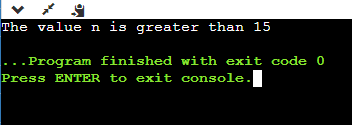
Explanation:
This C program compares two user-provided integer inputs to discover their relationship. The two integers' equality is first tested. A message stating that they are equal is printed if they are. The next condition checks whether the first integer is greater than the second and is invoked if they are not equal. A message stating that the first integer is greater is printed if this condition is true. The previous conditions must be true for it to fall into the 'else' block, which means the second integer must be greater. If so, it moves into the "else" block, and a message confirming this is printed.
In conclusion, this code correctly detects and communicates the relationship between the two input integers, stating whether they are equal; the first is greater, or the second is greater.
In C, what exactly are nested if-else statements?
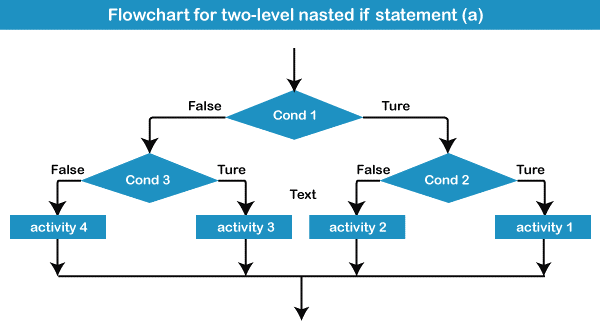
In the C programming language, nested if-else statements relate to using if expressions within other if statements. In a C program, this enables more complicated decision-making. The nested if-else expression is an if-else statement contained within another if-else statement. It enables programmers to define several branches of circumstances and run distinct code blocks in response to those conditions. Programmers can assess numerous criteria by nesting if-else statements.
Syntax:
if (condition1/expression1)
{
// If the condition1 is true, this block of code will be executed
if (condition2)
{
// If the condition2 is true, this block of code will be executed
}
}
How do nested if-else statements work?
Similarly to the if-else program, the following program compares two integers using > and =. To overcome the problem, we will utilize a built if-else statement.
Example:
//nested-if statement example in C program
int main()
{
int n = 15;
if (n == 15)
{
// Intial if statement
if (n < 25)
printf("\nThe value n is smaller than 25");
// Nested - if statement
// This code will only be executed if statement above
// are true
if (n < 18)
printf("\nThe value n is smaller than 18 too");
else
printf("\nThe value n is greater than 18");
}
return 0;
}
Output:
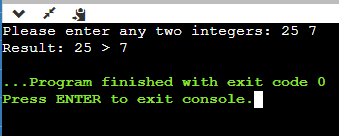
Explanation:
The use of nested "if" statements to assess numerous criteria is demonstrated in this C program. The variable 'n' is initialized to the number 15 to start. The first "if" expression considers the value of "n" and moves on to the next nested "if" statements when it determines that "n" equals 15. The first "if" statement in the nested block determines whether "n" is less than 25 and produces an appropriate message if it is. The following "if" statement looks at whether "n" is smaller than 18 and displays a separate message if this condition is satisfied, regardless of the result of the prior check. This is followed by the previous "if" statement. If "n" is bigger than 18 and not less than that, it enters the "else" block to indicate that it is greater than 18.
In summary, the program utilizes nested 'if' statements to assess conditions and present messages based on these evaluations systematically. This structure clearly illustrates how the program's logic unfolds through distinct code branches depending on the actual value of "n."
In C, what exactly is a switch case?
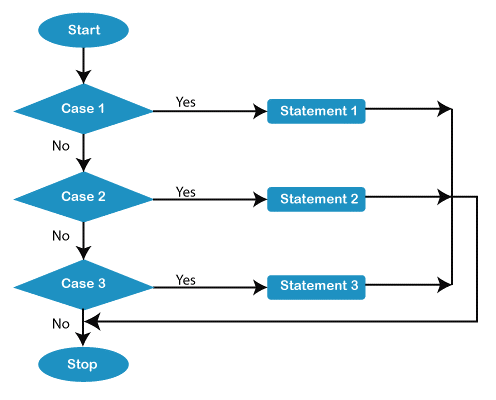
In a C program, this represents a single of the conditional expressions. A switch case is a structure of control in the programming language C that allows different sections of code to be executed based on the value of a specified expression. The switch case statement allows for several branches. It is frequently used if there are several possible outcomes to a given event. According to the condition and control, whatever statement under the given label is executed. The default expression is run if none of the cases satisfy the switch case condition.
Syntax:
switch(condition/expression) {
case Constant1/Value1 :
/*When the value of expression equals Constant1/Value1, this block of code needs to be executed */
statement;
break;
case Constant2/Value2:
/* When the value of expression equals Constant2/Value2, this block of code needs to be executed */
statement;
break;
case Constant3/Value3 :
/* When the value of expression equals Constant1/Value1, this block of code needs to be executed*/
statement;
break;
default : /* Optional */
statement;
}
Example:
//Switch statement in C example in C
#include <stdio.h>
int main()
{
int Num = 25;
switch (Num)
{
case 15:
printf("The Case 1 value is matching");
break;
case 20:
printf("The Case 2 value is matching");
break;
case 25:
printf("The Case 3 value is matching");
break;
default:
printf("No case is matching");
break;
}
return 0;
}
Output:

Explanation:
The switch statement is used in this C program to decide the next step based on the value of the variable 'Num.' 'Num' is given the value 25 at the beginning. The "switch" statement compares various "case" values to "Num" after evaluating it. As 'Num' is equal to 25, it corresponds with 'case 3' in this instance. The code related to "case 3" is thus executed, and the message "The Case 3 value is matching" is printed. The 'break' line after 'case 3' is very important because it ensures that once a matched case is discovered, the program exits the 'switch' statement to stop the execution of additional instances. If "Num" didn't match any of the "case" values, the "default" block would be executed and display "No case is matching." Since "Num" in this instance matches "case 3," it avoids the "default" section. Selecting a specific action based on the value of "Num" is made easier with the help of this "switch" statement.